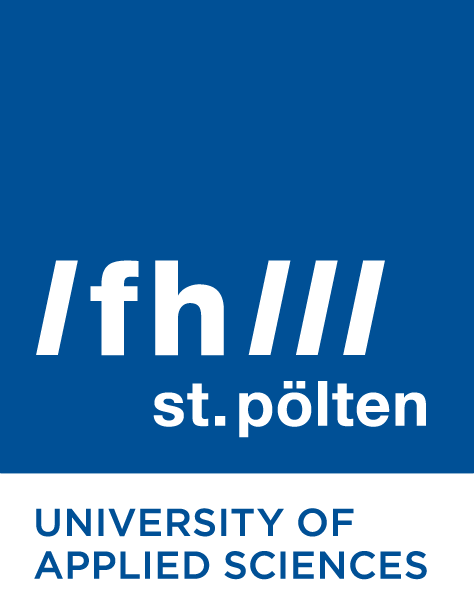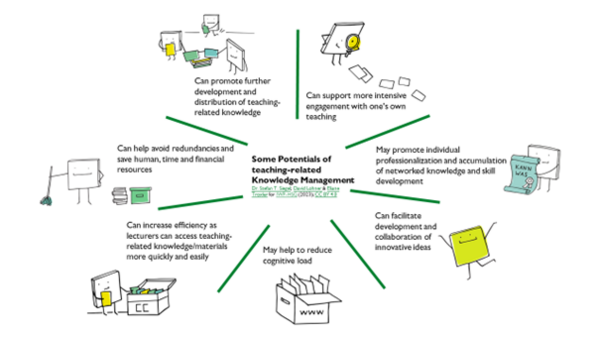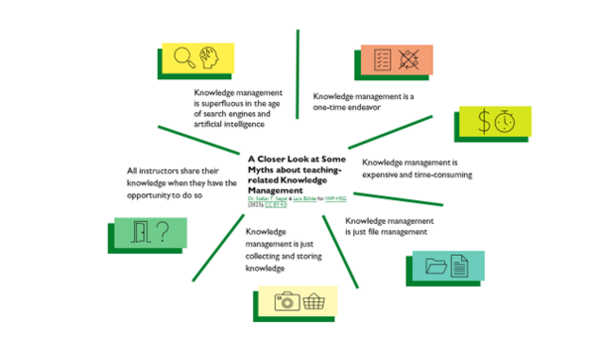🛠️ Knowledge Management in Teaching: Potentials, & Myths
#KnowledgeManagement #Teaching #ToolsForThought #Potentials #Myths
Stefan T. Siegel, David Lohner
1. What is Teaching-related Knowledge Management? [1]
As knowledge workers (Reinmann, 2008), teachers and educators process large amounts of information and knowledge (e.g., feedback from students, new content knowledge from articles) in their everyday lives. Knowledge (different from mere data or information) is seen as intellectual capital and an important asset in many organizations - including universities in our “knowledge society” (Unesco, 2005). Accordingly, a good, i.e., a systematic, efficient, and sustainable, use of this resource seems reasonable. Teaching-related knowledge management (TKM) is one way in pursuing this. TKM covers a wide range of practices of identifying, creating, (further) developing, storing, and disseminating knowledge (Siegel et al., 2021, 2022). In a nutshell, it is about building a personal «Zettelkasten» (Luhmann, 1992), a slipbox, to capture, collect, organize, and transform notes or a treasure trove of knowledge with knowledge building blocks.
In short, TKM can be understood as the process of creating smart notes (Ahrens, 2022), managing your (digital) stuff (Bergman & Whittaker, 2016) or extending or distributing your cognition (Forte, 2022).
2. Why is TKM Crucial for Teachers, or What are its Potentials?
If done right, teachers and educators can benefit in various ways from TKM. Some potentials are displayed in Figure 1:
Example: Writing down ideas or tasks in the form of (fleeting) notes (Ahrens, 2022) can help lecturers to reduce their cognitive workload during demanding tasks or in complex pressure and/or stress situations (e.g., teaching).
Overall, TKM is demanding (e.g., because of the required knowledge, willingness, and ability) but can be beneficial (e.g., in terms of efficiency, sustainability and individual professionalization), insofar as key challenges and myths do not interfere (for a more detailed description of these potentials see Siegel & Lohner (2024)).
3. What Myths about TKM are lurking Around?
Often individuals and organizations encounter or (un)consciously hold myths, i.e., erroneous assertions about knowledge management, that can hinder teachers from engaging in (effective) TKM-practices. Figure 2 lists some of those myths:
Example: (Teaching-related) knowledge management is superfluous in the age of search engines and artificial intelligence where “knowledge” seems to be only a few clicks away. In fact, both tools are powerful, however information (the tools outputs) is not the same as (incorporated) knowledge and what you search or prompt for is guided by what you already know. This also determines whether and how you can use the information presented (Christodoulou, 2014).
Being aware of these myths and knowing about evidence-informed TKM-practices, grounded e.g., in educational psychological research can help teachers and educators to build a personal knowledge management system in a more systematic, efficient, and sustainable way.
4. TKM-Workshop @ ICM and beyond 2024
In the workshop at the ICM and beyond 2024 we will therefore provide our participants with some of the most relevant basics of TKM with digital tools for thought. We will discuss and reflect on the potentials, limitations, and myths of TKM mainly from an educational psychological perspective. To put theory into practice, we will explore and use the tool for thought obsidian.md to better design our own teaching (e.g., working with templates to formulate learning objectives...). The workshop leaders will share key learnings and practical tips, from researching and using TKM and the tool obsidian for several years.
[1] This blog post is partly based on Siegel & Lohner (2024, i.p.).
- Ahrens, S. (2022). How to take smart notes: One simple technique to boost writing, learning and thinking. CreateSpace.
- Bergman, O. & Whittaker, S. (2016). The science of managing our digital stuff. MIT Press.
- Christodoulou, D. (2014). Seven myths about education. Routledge.
- Forte, T. (2022). Building a second brain: a proven method to organize your digital life and unlock your creative potential. Atria Books.
- Luhmann, N. (1992). Kommunikation mit Zettelkästen. Ein Erfahrungsbericht. In A. Kieserling (Hrsg.), Universität als Milieu. Kleine Schriften, S. 53–61. Bielefeld: Haux.
- Reinmann, G. (2008). Lehren als Wissensarbeit? Persönliches Wissensmanagement mit Weblogs. Information Wissenschaft & Praxis, 59(1), 49–57. http://www.dabis.org:4000/!bbfa!2008/02/Wissensmanagement_Weblogs.pdf
- Siegel, S. T.; Lohner, D. (2024; i. E.): Wissensmanagement von Lehrenden mit „Digital Tools for Thought“: Potenziale, Grenzen und Einsatzmöglichkeiten. Neues Handbuch Hochschullehre.
- Siegel, S. T., Krummenauer-Grasser, A. & Stahl, C. (2021). Lehrbezogenes Wissensmanagement in der Hochschullehre: Entwicklung, Beschreibung und Einsatzmöglichkeiten des Reflexionsinstruments LeWiMa. Der pädagogische Blick, 29(3), 195–205.
- Siegel, S. T., Krummenauer-Grasser, A. & Stahl, C. (2022). Lehrbezogenes Wissensmanagement: Herausforderungen und Potenziale am Beispiel der Manuale des Projekts LeHet. In A. Hartinger, M. Dresel, E. Matthes, K. Peuschel & U. Nett (Hrsg.), Lehrkräfteprofessionalität im Umgang mit Heterogenität: Theoretische Konzepte, Förderansätze, empirische Befunde. Waxmann.
- UNESCO. (2005). Towards knowledge societies. UNESCO Publishing. https://unesdoc.unesco.org/ark:/48223/pf0000141843
Dr. Stefan T. Siegel
University of St. Gallen (HSG), Institute of Business Education and Educational Management (IWP)
Postdoc Researcher and Lecturer with Interests in Educational Theory, Educational Myths, Sustainability Education, Educational Media
Stefan.Siegel@unisg.ch
StefanSiegel.de
Stefan T. Siegel:
Was sind Eure Geheimtipps, die Euch dabei helfen, Euren digitalen "Kram" zusammenzuhalten? Was fehlt euch noch?Mehr Infos zu evidenzinformiertem Wissensmanagement gibt es auch auf dem brandneuen Blog von David Lohner und mir, dem [[notelab]]: https://notelab.hypotheses....


